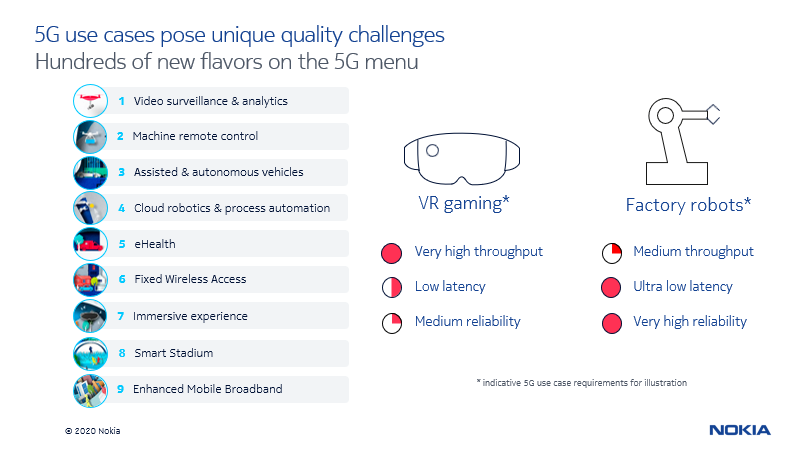It’s clear that 5G is not only going to revolutionise the way consumers connect with each other, but also how enterprises around the world will streamline their operations. With this in mind, says Andrew Burrell, head of Ultra Broadband & Analytics services, Nokia, service providers need to carefully consider how they are going to ensure they can provide and manage the necessary quality standards to meet this increased demand when upgrading their systems to enable 5G delivery.
While consumers may be forgiving of some buffering while streaming a film, the effect of latency on enterprises could interrupt their day-to-day business and potentially significantly increase their costs. It is not enough for service providers to invest in the hardware in order to deliver reliable 5G to consumers and businesses, the real stand-out value – and profit – lies in intelligent, automated operations to protect their networks and assure service quality.
With 5G, network slicing will be imperative for service providers. High quality 5G slices are necessary to deliver the extra services required, whether through VR gaming for consumers where high throughput is necessary, or for manufacturers where essential components like factory robots need extreme low latency and very high reliability in all their operations.

Enterprise customers require a guarantee of quality, committed service level agreements (SLAs), not just ‘best effort’. With value created by the Internet of Things (IoT) predicted to be up to US$3,700 billion (€3280 billion) in factories alone, it is essential that 5G and the advantageous services provided by slicing are maintained. And leveraging artificial intelligence (AI) is the only way to guarantee the needed quality.
Slices and automation
Slices are complicated to set up and service providers are going to have potentially thousands to create and maintain. In practice it is unrealistic to configure all these slices manually, and by automating network slicing the Total Cost of Ownership can be reduced by up to 28%.
Likewise, when it comes to operations, managing a myriad of issues across such a broad range of slices to maintain a high level of quality is impossible to do manually, especially at scale. AI and machine learning can look for issues that will arise, then prioritise for the network and service operations teams to fix.
There are many thousands of alerts a day that come into the service operations centre, so intelligently programmed automation can help teams quickly identify what needs to be prioritised to ensure an issue that arises doesn’t have costly knock on effects to enterprise customers. At its best, automation bypasses the need for human intervention or maintenance teams to be sent out (a costly and time-consuming process) and finds solutions so quickly the enterprise customer does not even notice any change in quality.

For example, Nokia AI solutions have already helped service providers such as Oi Brazil and Telenor Pakistan transform their operations, through machine learning algorithms that can improve quality, by predicting and preventing service degradations up to seven days in advance. And Singtel is currently pursuing a very interesting trial that aims to provide enterprise customers with a secured network slice, on demand, in a matter of minutes for 5G use cases including cloud gaming, manufacturing, and maritime operations.
Operating a telco network has always been complex, but with 5G and the increasing integration of IoT, networks will be more complicated than ever. That’s why operators should embrace AI solutions from companies who have a deep understanding of the complexities of the space and have a proven record in helping monitor and maintain quality standards across the whole 5G network. AI itself is not enough, telco expertise is essential too – and we are here to help.
The author is Andrew Burrell, head of Ultra Broadband & Analytics services, Nokia.
Comment on this article below or via Twitter: @VanillaPlus OR @jcvplus






